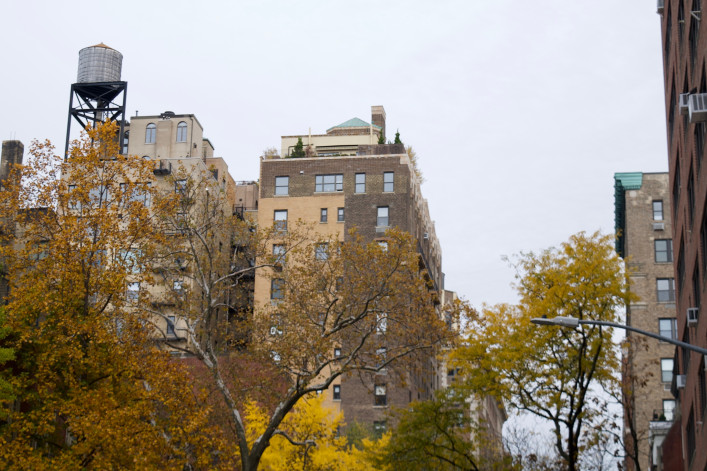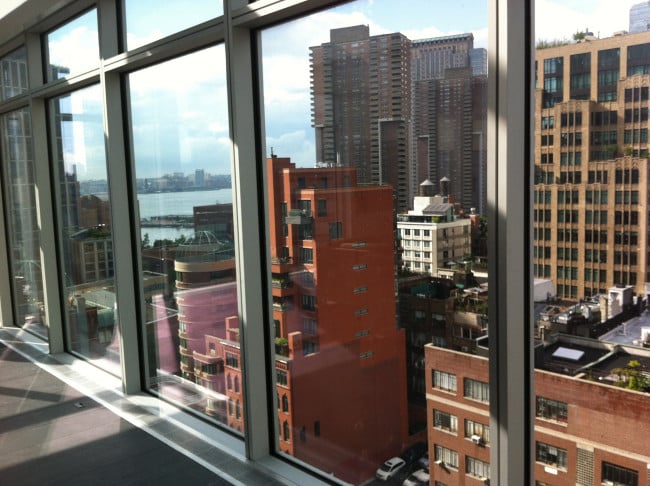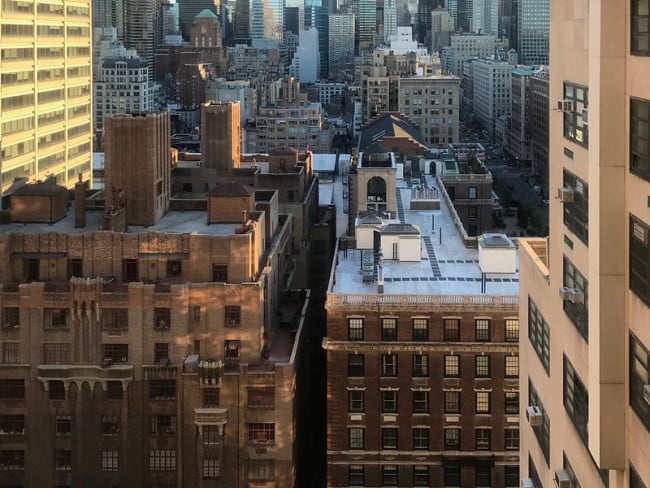Amid rising prices and inflation fears, NYC buyers look for apartments with low carrying costs

Seeking out a building with low monthlies is one of the few ways buyers can exert some control over the market these days.
Emily Myers for Brick Underground
Concerns about inflation and tax increases are making carrying costs a major consideration for today's condo and co-op buyers. Brokers say that with New York City prices rising, buyers are increasingly focused on keeping these monthly costs (relatively) low.
Carrying costs have always been an important consideration when figuring out what you can afford to buy in NYC. Just to refresh: They're the monthly payments apartment owners make for the upkeep of their building. They can range from several hundred to several thousand dollars however, the median has risen sharply in the past year, according to Jonathan Miller, president of appraisal firm Miller Samuel. He attributes this to "a shift in the mix towards luxury sales post-lockdown."
And so buyers, already under a lot of pressure from a scarcity of listings and bidding wars—at their highest level in three years—are balking at apartments with high carrying costs.
Vickey Barron, a broker with Compass, says she has several clients expressing concerns about carrying costs right now, including one buyer who is hesitating over the purchase of a penthouse in excess of $20 million with "exorbitant" monthlies. Glenn Davis, a broker with Douglas Elliman, says regardless of whether he's dealing with a first-timer buyer, an investor, or someone wanting a pied-à-terre—one of the first questions is about carrying costs. “People are looking to try and keep their overheads lower,” he says.
Many buyers are taking advantage of low mortgage rates rather than paying all cash so they already have monthly payments to consider. Other reasons you might be paying more attention to carrying costs include concerns about inflation, potential city and property tax increases, or worries about the slate of local laws that could affect assessments.
Barron says even all-cash buyers who don't see carrying costs as a financial burden know that very high monthlies could affect them when they try to sell.
"The reality is, they don't go down, they only go up," Barron says.
What's the purpose of carrying costs?
As a buyer, you'll want to know that the building is good financial health—that it can cover building expenses with the funds coming in but also has funds in reserve for emergencies like a broken boiler or leaking roof. Understanding what the carrying costs pay for is helpful in evaluating whether they are reasonable and how they might increase over time.
In a co-op, these payments are called maintenance fees and cover the building's insurance, mortgage, and property tax, plus the salaries of employees like the property manager and the doorman as well as the upkeep of common areas. Heat, hot water, utilities, pest control, trash, and snow removal as well as the upkeep of amenities like a bike room, gym, pool, or storage might also come out of the maintenance fees.
In a condo, these monthly payments are called common charges and because there is no mortgage on a condo building and property taxes are paid separately by owners, the payments to the board are usually a little lower than in a co-op, although your total monthly cost may be higher when you factor in the property tax.
What is a reasonable monthly carrying cost?
Barron says the average carrying cost for a co-op is around $2.20 per square foot per month. "Even $2.40 or $2.50 per square foot is reasonable and nothing alarming," she says.
Your carrying costs will vary with the quality of building you are buying and the neighborhood. The current median for a condo's common charges plus taxes is around $3 per square foot.
"From Brooklyn to Manhattan to Astoria, Queens you are going to see different numbers and rising carrying costs," Davis says. He says a carrying cost over $3.20 per square foot would be "eye popping if the amenities weren't substantial."
He represents sales at Forena, a new condo development in Greenwich Village, where the common charges are $2.61 per square foot.
"Seeing a variable under $3 per foot is enticing for buyers—any time you add a doorman, a gym that needs maintenance, a lounge that needs maintenance, exterior facade or landscaping that needs maintenance, porter service—that just goes up with the class of the building," he says.
It's important to remember that monthlies also reflect the building's financial strategy. So if the building doesn't have a lot of services, or doesn't have a reserve fund, or there are regular assessments, or maybe there's a flip tax, then you should be asking questions about how the building is run and where the monthly payments are actually going.
Looking to buy a co-op apartment? National Cooperative Bank offers competitive rates and easy pre-qualification. With 40 years of lending to buyers in New York City, NCB is the bank for co-ops. After all, Cooperative is our middle name! Call us at (646) 201-4714 or email Brittney Baldwin at [email protected]. NMLS #507535. Equal Housing Lender.
How do you calculate increases in carrying costs?
For many buyers, inflation is a concern when it comes to monthlies.
"Buildings cost a lot of money to run and with inflation it is going to cost more. And there's also politics to consider—property taxes, city taxes, it’s all going to go up, the question is by how much and when," Barron says.
Barron's penthouse buyer wants to know how the carrying costs will change over time. "His concern is—since it's a new development that isn't finished—what will these monthlies be in two years? It has been a very trying process to research and forecast the figures," she says.
The offering plan of a new development will have projections for the common charges, but they are often underestimated.
Ari Goldstein, senior vice president of development at Extell, the developer of Brooklyn Point and One Manhattan Square, says buyers should be careful of sponsors listing artificially low carrying costs in the first year. Goldstein says that might be because that first year is being assessed as if the building is still under construction.
"In the second year there's going to be a big spike because the building is not under construction any more," he says.
On a resale apartment, you'll want to find out from the listing agent how often the maintenance has increased over the past decade and by what amount. If there have only been one or two increases it may be manageable. If there are increases every year, you'll have a sense of where it could be in five year's time.
Higher monthlies can affect not just whether you meet the debt-to-income requirements for a co-op you want to buy, but also whether the buyers you ultimately want to sell your apartment to in five or 10 years can do the same. For example, if there are two 700-square-foot apartments and one has carrying costs of $1,500 and the other has carrying costs of $2,300, that's a fairly big difference for a first-time buyer and might rule out their eligibility either for a mortgage or for the co-op's debt-to-income requirements.
Barron is dealing with this exact situation with a first-time buyer deciding whether to pay more for an apartment where the monthlies are lower. Right now she says she's more comfortable stretching her mortgage rather than being on the hook for higher carrying charges.
How to find apartments with lower monthlies
You will likely have heard of buyers taking advantage of tax abatements or having carrying costs taken care of by the sponsor.
Tax abatements do help reduce monthly costs in condos and have been offered in some buildings where the developer meets certain requirements. However, many of these tax abatements have since expired so these opportunities are limited.
There are projects that qualified under the old program and still are able to offer it and Brooklyn Point is one of those projects, offering a 25-year tax abatement, Goldstein says. He says for a two-bedroom apartment, the total carrying cost, including taxes, is $1,400.
"If we didn't have a tax abatement it would have been $3,300 per month," he says.
When sales are sluggish, developers have also been known to offer to pay a buyer's carrying costs for a year or more but those perks evaporated as the market heated up.
To reduce monthlies, the most obvious route is to find a building with pared down amenities or services. You'll also find that maintenance in a co-op goes up if you are on a higher floor in the building, so lower floor apartments are a good place to look for lower monthlies.
You Might Also Like



























